10 Best Flashlights in 2024 — Reviews & Top Picks
Last Updated on
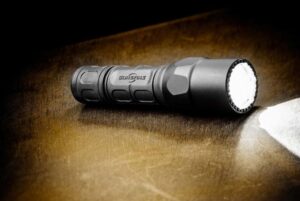
Most of us probably get by all right just using our smartphone’s flashlight. That’s fine if you only need to find the keyhole to open the front door. However, many things make them awkward to use for other tasks, starting with their shape. If you need light for a while or a stronger beam, a handheld flashlight is the way to go. If you haven’t shopped for one recently, you’re in for a surprise.
Technology, including the move toward LEDs, has changed the playing field. You can get a lot of bang for your buck. You’ll also find that flashlights now have many new features and better designs. Our guide includes what you need to know with some reviews to help with your comparison shopping.

A Quick Look at Our Favorites in 2024
| Image | Product | Details | ||
|---|---|---|---|---|
| Best Overall |
 |
Streamlight Stinger DS Flashlight |
|
CHECK PRICE |
| Best Value |
 |
Streamlight MicroStream LED Pen Light |
|
CHECK PRICE |
| Premium Choice |
 |
SureFire Everyday Carry Tactical Flashlight |
|
CHECK PRICE |
 |
Streamlight PolyTac C4 Flashlight |
|
CHECK PRICE | |
 |
SureFire G2X LE Dual-Output Flashlight |
|
CHECK PRICE |
The 10 Best Flashlights
1. Streamlight Stinger DS Flashlight – Best Overall

| Type: | Everyday carrier (EDC) |
| Material: | Aluminum |
| Light output: | 800 Lumens |
| Battery life: | 10 hours on low |
| Water Resistance or IP rating: | IPX-4 |
The manufacturer of the Streamlight Stinger DS Flashlight seems to have thought about everything when they created this product. It is well made and durable, with a rubberized finish for a comfortable hand feel. The lens is unbreakable and even has a scratch coating. The product is serialized for added peace of mind should you lose it. All these things make this device our pick for the best overall flashlight. The only downside? It is a bit expensive compared to other models.
- Rechargeable
- Excellent beam distance
- Dual switch with SOS strobe
- Limited lifetime warranty
- Expensive
2. Streamlight MicroStream LED Pen Light – Best Value
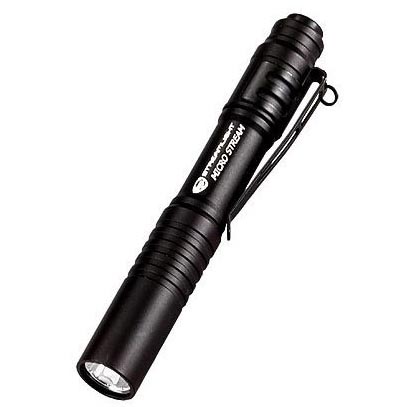
| Type: | EDC |
| Material: | Aluminum |
| Light output: | 45 lumens |
| Battery life: | 25 hours |
| Water Resistance or IP rating: | IPX-4 |
The Streamlight MicroStream LED Pen Light packs a big punch for such a small device. It’s lightweight and easy to carry thanks to the sturdy O-ring attachment. It also includes a removable pocket clip if you’d prefer to carry it that way. The design and construction are high-quality, despite its size. Its excellent value makes it our choice for the best flashlight for the money. The only downside is that it has a shorter runtime compared to other flashlights.
- Lightweight
- Affordably priced
- Excellent value
- O-ring attachment
- Short runtime
3. SureFire Everyday Carry Tactical Flashlight – Premium Choice
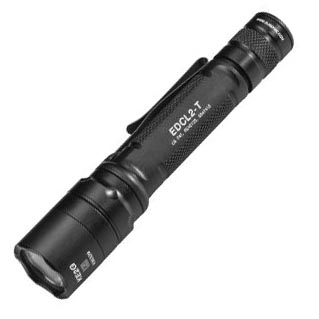
| Type: | EDC, tactical |
| Material: | Aluminum |
| Light output: | Up to 1,200 lumens |
| Battery life: | 1 hour on high, 60 hours on low |
| Water Resistance or IP rating: | IPX7 |
The SureFire Every Day Carry Tactical Flashlight is a sturdy device built to handle the roughest conditions. Its user-friendly design makes one-hand operation a snap. It has an ergonomic handle that makes it comfortable to hold, and its two-way clip keeps it in place with no worry of losing it. It has a nearly 700-foot beam distance. The flashlight comes with a 90-day guarantee with a limited lifetime warranty for defects. However, because this is our premium choice, expect it to cost a pretty penny.
- Two-way clip
- Durable and made of quality materials
- 700-foot beam distance
- One-hand operation
- Expensive
4. Streamlight PolyTac C4 Flashlight
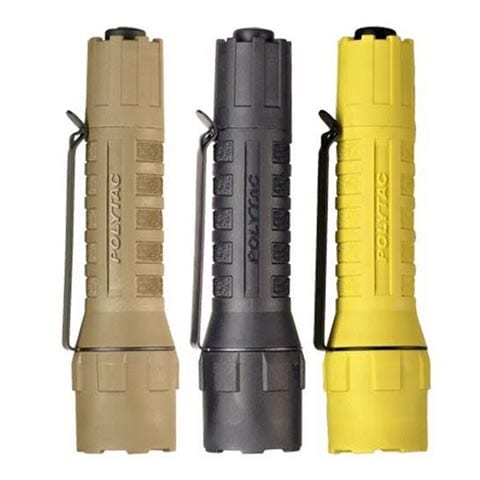
| Type: | EDC |
| Material: | Nylon polymer |
| Light output: | Up to 600 lumens |
| Battery life: | 75 hours on high, 60 hours on low |
| Water Resistance or IP rating: | IPX7 |
The Streamlight PolyTac C4 Flashlight does an excellent job as a backup to have on hand in the car or in your tent. The light output is decent with three settings, including a strobe setting. Customers like the longer battery life of the latter. It comes in three color choices and runs on lithium-ion batteries. The IP rating and impact resistance are more than we’d expect for a product of this kind. Overall, it’s a great value for the price.
- SOS strobe
- Three brightness settings
- Limited lifetime warranty
- Less durable than metal products
5. SureFire G2X LE Dual-Output Flashlight
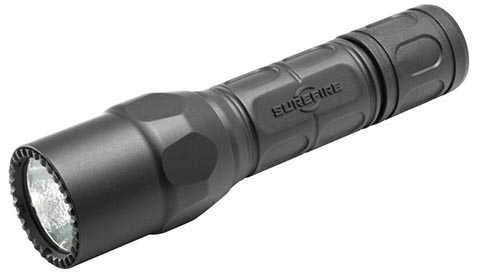
| Type: | ETC, tactical |
| Material: | Aluminum with a nitrolon polymer wrapping |
| Light output: | 600 Lumens |
| Battery life: | 25 hours on high, 45 hours on low |
| Water Resistance or IP rating: | IPX-7 |
The SureFire G2X LE Dual-Output Flashlight ticks off many of the boxes we like to see in a heavy-duty device. It’s well made and built to last. The wrapping on the light is a welcome touch that makes it easier to hold in cold conditions. The battery life is decent. However, the reflector makes the most of the output for focusing on or scanning the surroundings. It’s lightweight, too, at only 4.4 ounces. This is another expensive option, especially since there is no SOS feature.
- Parabolic reflector
- Waterproof
- Over 600 feet beam distance
- Made in the USA
- Expensive
- No SOS
6. Nitecore TINI 2 Rechargeable Keychain Flashlight
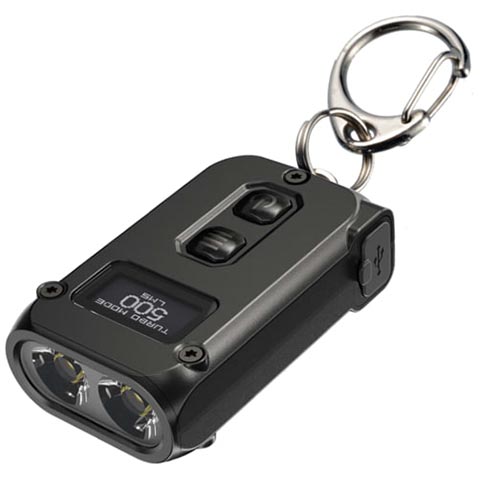
| Type: | EDC, keychain |
| Material: | Aluminum |
| Light output: | Up to 500 lumens |
| Battery life: | 15 minutes on turbo, 60 hours on low |
| Water Resistance or IP rating: | IP54 |
The Nitecore TINI 2 500 Lumen Rechargeable Keychain Flashlight is an excellent choice for an EDC model to keep on your keychain or belt. It provides a lot of light with reasonable runtimes for such a small product. It’s lightweight as well, which is ideal for you to throw in your pocket, purse, or car. The price isn’t out of line, either, considering what you get. The design makes it easy to use with single-handed operation.
- Titanium and stainless-steel options
- Rechargeable
- Five brightness levels
- Lightweight
- Occasional mode failures
- Too small for some jobs
7. Brite Strike Technologies Penlight
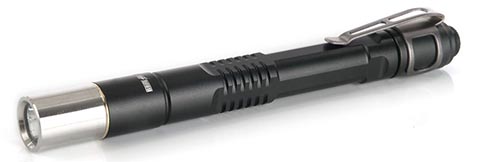
| Type: | EDC, penlight |
| Material: | Aluminum |
| Light output: | Up to 160 lumens |
| Battery life: | 30 minutes on high, 6 hours on low |
| Water Resistance or IP rating: | Waterproof but no IP rating available |
The Brite Strike Technologies Penlight is another handy device when you need a focused beam for detail work. It is well made with a graphite anodized finish for added durability. It has a clip attachment to keep it in a pocket or on the bill of a baseball cap. It provides some decent light, considering its size and the fact that it runs on AA batteries. It also has two brightness settings to optimize its use.
- Two brightness settings with strobe
- Well-directed beam
- Handy clip attachment
- AA power source isn’t the best
8. TUNFOU Rechargeable LED Flashlight
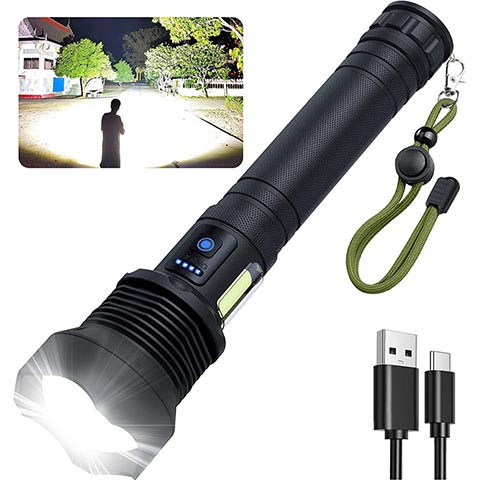
| Type: | EDC |
| Material: | Aluminum |
| Light output: | 90,000 lumens |
| Battery life: | Up to 12 hours |
| Water Resistance or IP rating: | IPX5 |
The TUNFOU Rechargeable LED Flashlight covers a lot of bases with seven modes that include five brightness settings and two different colored strobes. It also has a zoom-in function, which many customers like and find unique. We also appreciated the battery power LEDs to ensure that the flashlight has enough juice. It’s bigger and heavier than other products we considered. However, its versatility is a plus in its favor.
The high lumen figure is questionable given the battery life and size. Unfortunately, we could not verify it with the manufacturer.
- Lanyard
- Rechargeable
- Seven modes, including two strobe settings
- 2-year warranty
- Questionable lumen rating
- Relatively heavy
9. Maglite 3 Flashlight

| Type: | EDC |
| Material: | Aluminum |
| Light output: | 168 lumens |
| Battery life: | 80 hours |
| Water Resistance or IP rating: | IPX-4 |
We’d be remiss not to include an oldie but a goodie like the Maglite 3 Flashlight. It’s a larger device than most of the products on this list. It provides excellent light output with a far beam distance. The description mentions its use for security, so you know it is a reliable option—it is certainly heavy enough to fill that role.
The runtime is impressive, even though it gets its juice from batteries. This is also a very basic design that couldn’t get any easier to use.
- Sturdy
- Interchangeable lights
- Easy to use
- D-cell power supply
- Heavy
10. DEWALT Work Light / Flashlight
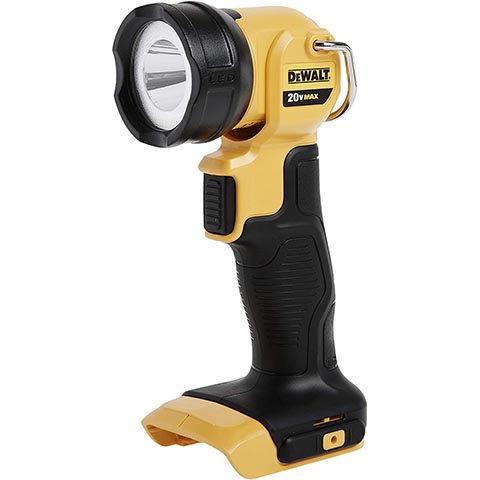
| Type: | EDC or shop light |
| Material: | Plastic |
| Light output: | 110 Lumens |
| Battery life: | Up to 25 hours |
| Water Resistance or IP rating: | N/A |
The DEWALT Work Light / Flashlight is an example of the versatility of these products. You can use it for small daily tasks or hang it from the metal hook as a shop light. The light output is decent in either case. Customers liked that you could rotate the head to direct the light where you need it. It’s remarkably durable, considering that it’s made of plastic. Unfortunately, the battery is sold separately, which detracts from its value.
- 3-year limited warranty
- Decent battery life
- Versatile use
- Bulky
- Battery not included

Buyer’s Guide: Choosing the Best Flashlights
The best flashlight depends on how you plan to use it. Most people get by with their smartphones. However, if you’re camping or walking the dog, you’ll need something more versatile and indeed brighter. The prices have gone up with the advancing technology. We suggest you look into everything a product has to offer. You may find one or more features put one in the dealmaker category. Things to consider include:
Type
It used to be that flashlights came in only a few styles. However, today’s flashlights come in a wide variety of designs, each with different features and varying specifications. Some products that you may see are:
- Pen light
- Keychain
- Every day carry (EDC)
- Multi-functional
- Spotlight
- Tactical flashlight
- Headlamp
- Hand-crank flashlight
- Shake flashlight
- Lantern
You undoubtedly can see that many products are specialized for certain uses by just glancing at the list. That’s why we encourage you to think about how you intend to use the flashlight. You should also consider what features would make it easier for you to use for that purpose.
Material
Aluminum and metal alloys are some of the most popular materials for flashlights. They are lightweight yet durable, making them more comfortable to handle. You’ll often see products with ergonomic designs that give them a good hand feel. Of course, there are plastic and polymer types that don’t sacrifice sturdiness with their lower prices. Other options you may see are magnesium, stainless steel, and titanium.
Light Output
A flashlight’s light output is probably the most important feature. It’s a wasted purchase if it doesn’t provide the illumination you need. Again, this goes back to your intended use. You’ll see this spec listed as lumens. The higher the figure, the more light you’ll get. To put it in perspective, your smartphone battery emits about 40– 50 lumens. That works for doing something close-up, but it isn’t sufficient for any real distance.
You’ll find products, such as squeeze LEDs, that give off less than 10 lumens. If you’re walking in the neighborhood, around 300 lumens will suit you fine without disturbing anyone. If you need to see a farther distance, kick it up to 1,000 lumens. You can expect a beam distance of over 600 feet, depending on the design. A reflector will focus the light and make even a flashlight with fewer lumens seem brighter.
High-end flashlights will push the envelope at 3,000 or even more lumens. Unless you’re going caving, anything more than 1,000 lumens is overkill. Another spec you may see related to output is the light’s temperature in degrees Kelvin. That tells you the warmth of the light. It’s probably more significant if you’re buying light bulbs than a flashlight. Products with cool daylight temps of 5,000 degrees Kelvin are suitable for most uses.
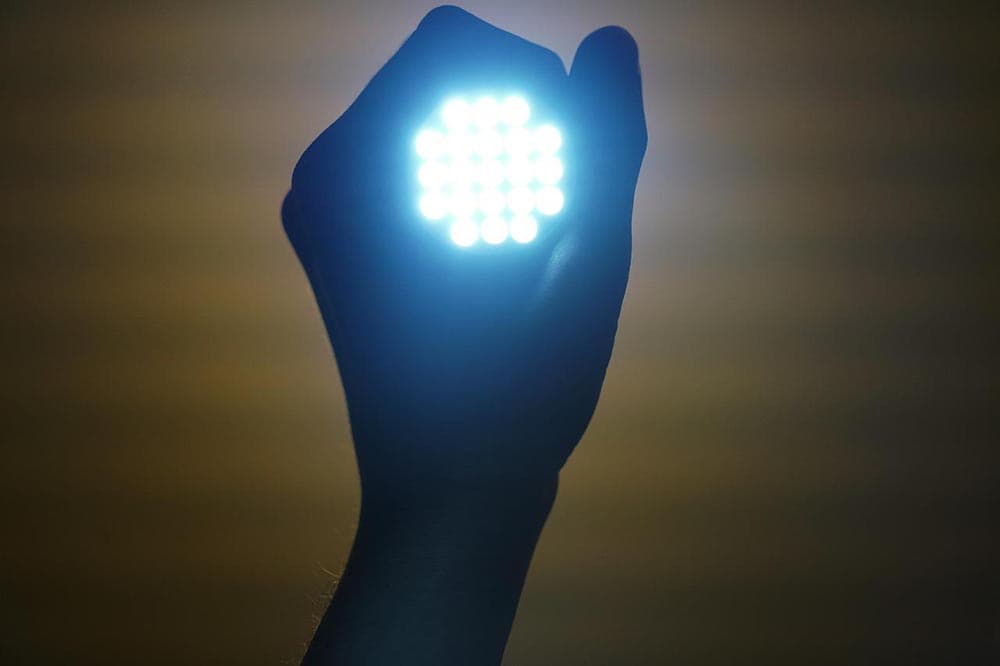
Battery Life
Technology has made great strides with battery life thanks to LEDs and lithium-ion batteries. Many products have multiple brightness settings to optimize energy use. Be sure to check the battery life for each one. You’ll likely see a large figure if you keep it on low and a substantially smaller one on high. We always recommend keeping some spares on hand, no matter what the power source.
LEDs have a clear advantage over incandescent bulbs. They use less juice and give off less heat, hence, the incredible lifespans of 30,000 or more hours. When they do go out, it happens gradually as, one by one, the flashlight’s diodes die.
Rechargeable, battery-powered flashlights also exist that are a godsend if you plan to use them a lot. We suggest checking the recharge time to ensure that it’s ready when you need it. Many people prefer products that use a standard USB instead of a proprietary charger.
Water Resistance or IP Rating
A waterproof or water-resistant device is a must-have feature if you plan to use your flashlight outdoors. The manufacturer may use either term to describe their product. They may also provide an International Protection Rating or IP rating. This rating consists of two figures. The first denotes its resistance to debris getting inside of the device. The second is for liquids. The label may give only the second.
The first figure ranges from zero to six, with the highest number offering the best protection. The second goes up to eight. A rating of at least four is decent, with a higher number preferable. They cover situations where an item might get submerged.

Conclusion
After completing our reviews, the Streamlight Stinger DS Flashlight came out on top as our overall pick for the best flashlight. It is built to last and will likely be the last one you need to buy. The Streamlight MicroStream LED Pen Light delivers the goods at an affordable price. You get the same quality and durability as more expensive products, making it an excellent value.
You may also be interested in: 10 Best Camping Lanterns — Reviews & Top Picks
Table of Contents
- A Quick Look at Our Favorites in 2024
- The 10 Best Flashlights
- 1. Streamlight Stinger DS Flashlight – Best Overall
- 2. Streamlight MicroStream LED Pen Light – Best Value
- 3. SureFire Everyday Carry Tactical Flashlight – Premium Choice
- 4. Streamlight PolyTac C4 Flashlight
- 5. SureFire G2X LE Dual-Output Flashlight
- 6. Nitecore TINI 2 Rechargeable Keychain Flashlight
- 7. Brite Strike Technologies Penlight
- 8. TUNFOU Rechargeable LED Flashlight
- 9. Maglite 3 Flashlight
- 10. DEWALT Work Light / Flashlight
- Buyer’s Guide: Choosing the Best Flashlights
- Conclusion
About the Author Chris Dinesen Rogers
Chris has been writing since 2009 on a variety of topics. Her motto with all of her writing is “science-based writing nurtured by education and critical thinking.” Chris specializes in science topics and has a special love for health and environmental topics, and animals of all shapes and sizes.
Related Articles:
How to Clean a Refractor Telescope: Step-by-Step Guide
How to Clean a Telescope Eyepiece: Step-by-Step Guide
How to Clean a Rifle Scope: 8 Expert Tips
Monocular vs Telescope: Differences Explained (With Pictures)
What Is a Monocular Used For? 8 Common Functions
How to Clean a Telescope Mirror: 8 Expert Tips
Brightfield vs Phase Contrast Microscopy: The Differences Explained
SkyCamHD Drone Review: Pros, Cons, FAQ, & Verdict



